Video Game Addiction Lawsuit Update | Video Game Lawsuit
- Last Updated: July 14th, 2025

Attorney Jessica Paluch-Hoerman, founder of TruLaw, has over 28 years of experience as a personal injury and mass tort attorney, and previously worked as an international tax attorney at Deloitte. Jessie collaborates with attorneys nationwide — enabling her to share reliable, up-to-date legal information with our readers.
Legally Reviewed
This article has been written and reviewed for legal accuracy and clarity by the team of writers and legal experts at TruLaw and is as accurate as possible. This content should not be taken as legal advice from an attorney. If you would like to learn more about our owner and experienced injury lawyer, Jessie Paluch, you can do so here.
Fact-Checked
TruLaw does everything possible to make sure the information in this article is up to date and accurate. If you need specific legal advice about your case, contact us by using the chat on the bottom of this page. This article should not be taken as advice from an attorney.
Key takeaways:
- The California Judicial Council established JCCP No. 5363 on May 7, 2025, consolidating over 100 video game lawsuits against major gaming companies including Epic Games (Fortnite), Roblox Corporation, Microsoft (Minecraft), EA, and Activision Blizzard for allegedly designing games with addictive features that specifically target and harm children.
- To qualify for a video game addiction lawsuit, individuals typically need to be aged 24 or younger with documented gaming of 2+ hours daily for extended periods, plus evidence of addiction-related harm such as medical diagnoses, academic failure, or mental health struggles linked to specific games.
- Potential compensation in gaming addiction cases includes medical treatment costs, lost educational opportunities, reduced earning capacity, family therapy expenses, recovery of in-game purchases, and punitive damages, with settlements expected to range from tens of thousands to hundreds of thousands of dollars based on severity of documented harm.
What is the Video Game Addiction Lawsuit?
Question: What is the Video Game Addiction Lawsuit?
Answer: The Video Game Addiction Lawsuit involves legal actions filed by parents and families against major game developers Microsoft, Epic Games, Electronic Arts (EA), Activision Blizzard, and Roblox Corporation in addition to a handful of other companies.
These lawsuits allege that popular video games like Fortnite, Minecraft, Call of Duty, and Roblox were intentionally designed with addictive features that specifically target and harm children and teenagers.
These design features allegedly exploit the developing brains of minors, leading to gaming disorders recognized by the World Health Organization as Internet Gaming Disorder (IGD).
On this page, we’ll answer this question in further depth, physical and mental health effects of Internet Gaming Disorder, long-term effects of video game addictions, and much more.
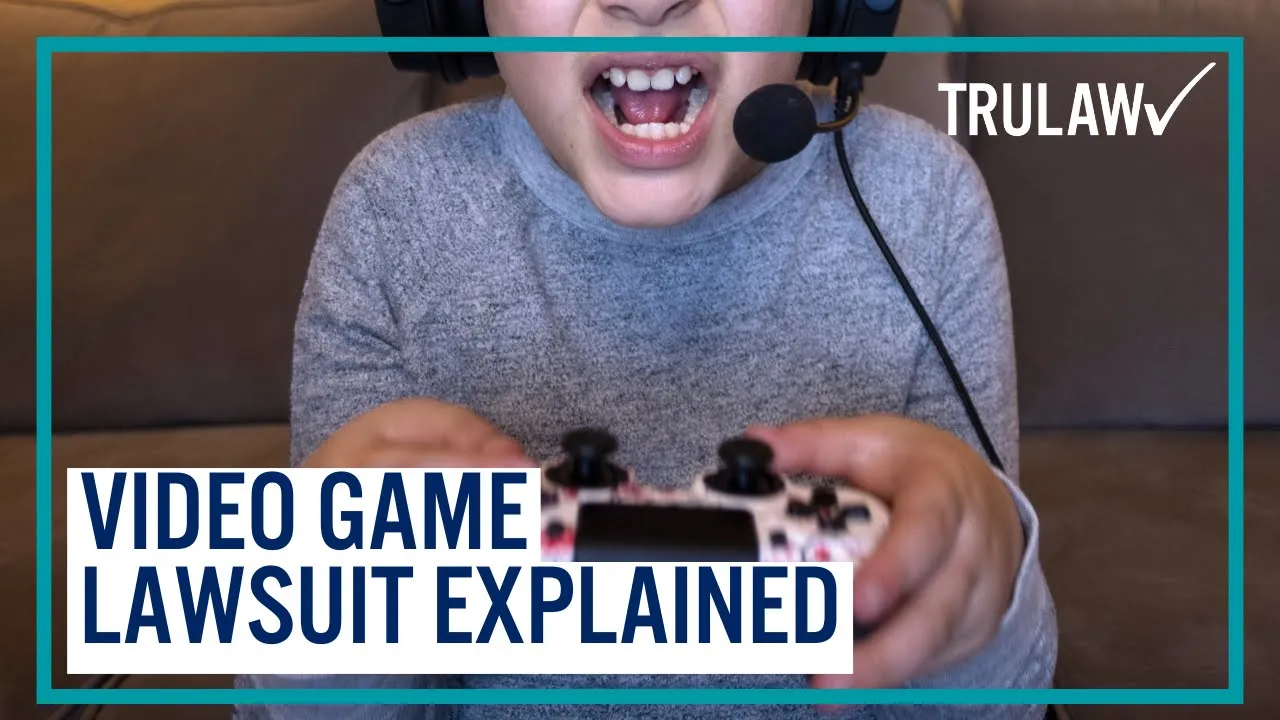
Legal Action Taken Against Video Game Developers for Targeting Children
The Video Game Addiction Lawsuits assert that gaming companies utilized sophisticated psychological tactics borrowed from gambling and behavioral addiction research.
Video game addiction litigation reached a major milestone in 2025 with the California Judicial Council’s approval of coordinated proceedings to consolidate over 100 lawsuits against the video game industry.
Families pursuing legal action report their children have experienced severe mental health issues, including anxiety, depression, social withdrawal, academic decline, physical health problems from excessive gaming, and other severe health conditions.
Legal experts compare these cases to historic tobacco and opioid litigation, arguing that gaming companies knew their products could cause harm but prioritized revenue over consumer safety.
If you or someone you love has experienced mental health issues, academic decline, or other serious problems related to video game addiction, you may qualify to seek compensation.
Contact TruLaw using the chat on this page to receive an instant case evaluation that can determine your eligibility to join others in filing a Video Game Addiction Lawsuit today.
Table of Contents
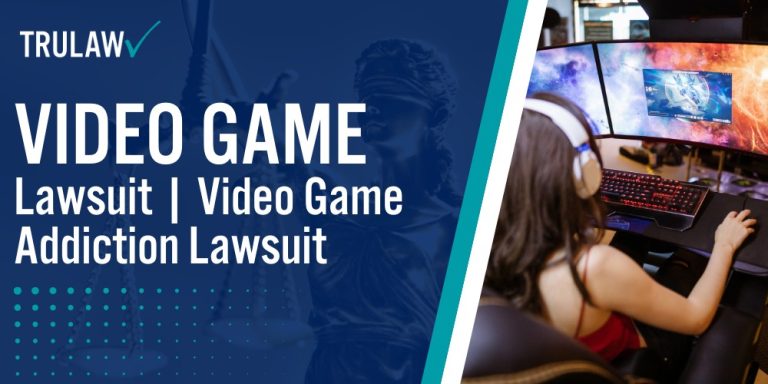
Video Game Addiction Lawsuit Updates Timeline
The British Columbia Supreme Court has approved a class action lawsuit against Electronic Arts (EA) over its use of “loot boxes” in video games.
Loot boxes are in-game features offering randomized virtual items, such as currency, tools, or cosmetic upgrades, which can provide gameplay advantages.
Players can purchase these boxes with real money or virtual currency earned in-game.
The lawsuit accuses EA of designing loot boxes to obscure the low odds of obtaining valuable items, encouraging repeated purchases.
Popular EA games featuring loot boxes include FIFA, Madden NFL, NHL, NBA Live, and The Sims series.
Justice Margot Fleming allowed the case to proceed, noting that loot boxes rely on algorithms generating randomized rewards, often requiring real money for significant in-game progression or valuable item acquisition.
The plaintiff alleges that EA exploits players by structuring loot boxes to hide the true odds of receiving high-value rewards, fostering compulsive spending.
In response, EA denies the claims. Kerry Hopkins, EA’s senior vice president of legal and governmental affairs, described the allegations as “wholly misconceived,” emphasizing that purchasing loot boxes is entirely optional.
EA also pointed to the court’s previous dismissal of claims linking loot boxes to gambling, reaffirming that its games do not constitute gambling.
The company is considering an appeal against the decision to certify the class action.
This case mirrors similar lawsuits filed in the United States, reflecting growing scrutiny of loot box practices in the gaming industry.
If your child has experienced video game addiction, mental health challenges, an eating disorder, or other health issues linked to excessive video game use, you may qualify to file a video game addiction lawsuit.
Contact TruLaw for a free consultation, or use the chatbot on this page to instantly determine if you are eligible to take legal action.
A recent report from the WHO Regional Office for Europe highlights alarming trends in adolescent digital behavior, particularly a rise in problematic social media use and gaming addiction.
Data from the Health Behaviour in School-aged Children (HBSC) study, which surveyed nearly 280,000 adolescents across 44 countries, shows that the prevalence of problematic social media use increased from 7% in 2018 to 11% in 2022.
Additionally, 12% of adolescents are now deemed at risk for problematic gaming, raising significant concerns about the effects of digital technology on youth mental health.
Key findings from the report:
- Problematic Social Media Use: 11% of adolescents show signs of problematic social media behavior, with higher rates among girls (13%) compared to boys (9%). A third of adolescents engage in daily gaming, and 22% play for at least four hours on gaming days.
- Impact of Problematic Use: Previous studies have linked problematic social media use to lower mental and social well-being, increased substance use, and negative effects on sleep and academic performance. In contrast, heavy but non-problematic users reported stronger peer support and social connections.
- Gaming Trends: 34% of adolescents reported playing digital games daily, with 12% identified as at risk for problematic gaming.
The rise in problematic digital behaviors suggests potential long-term consequences for adolescent mental health.
Dr. Hans Henri P. Kluge, WHO Regional Director for Europe, emphasized the need for enhanced digital literacy education to address these risks.
He noted that while digital engagement can promote connection, it can also lead to issues like anxiety, bullying, and poor academic performance if not managed properly.
If your child has suffered from video game addiction, mental health disorders, an eating disorder, or other health issues related to excessive video game use, you may be eligible to file a video game addiction Lawsuit.
Contact TruLaw for a free consultation or use the chatbot on this page to see if you qualify for legal action instantly.
The motion to centralize several Video Game Addiction Lawsuits has been denied.
Plaintiffs in five separate cases had requested the consolidation of litigation related to video game addiction under 28 U.S.C. 1407, aiming to transfer these cases to either the Western District of Missouri or the Eastern District of Arkansas.
Since the motion was filed, ten more related cases have arisen, increasing the total to fifteen across ten districts.
These lawsuits claim that various video game developers, digital app stores, and tech companies have deliberately designed and marketed games with psychologically addictive elements, particularly targeting minors and young adults.
All defendants opposing the centralization motion suggest that if the Panel chooses to proceed, either the Eastern District of Arkansas or the Northern District of Georgia would be suitable for consolidation.
After reviewing the submitted materials and holding a hearing, the Panel determined that centralization would not improve the convenience for the parties and witnesses, nor would it promote a fair and efficient process for these cases.
If your child has suffered from video game addiction, mental health disorders, an eating disorder, or other health issues related to excessive video game use, you may be eligible to file a video game addiction Lawsuit.
Contact TruLaw for a free consultation or use the chatbot on this page to see if you qualify for legal action instantly.
A recent study from McGill University in Canada has uncovered troubling connections between video game addiction in children and an increased risk of developing psychosis in adulthood.
These findings raise serious concerns regarding the long-term mental health effects of excessive screen time among young people.
Published in JAMA Psychiatry, the research analyzed a cohort of 1,226 participants born in 1997 and 1998.
The study aimed to evaluate the impact of smartphone and social media use during adolescence on mental health by the age of 23.
The results revealed a direct association between high levels of video gaming and the onset of psychotic experiences, including paranoia, delusions, and hallucinations.
According to the study, individuals who engaged in significant gaming and fluctuating computer use during their teenage years had a 3-7% increased likelihood of developing psychotic symptoms as they entered adulthood.
These symptoms included feelings of persecution, unusual thoughts, and perceptual disturbances, such as hearing voices while alone.
The study also highlighted concerning trends linking excessive screen time to loneliness, bullying, and strained parent-child relationships.
If your child has suffered from video game addiction, mental health disorders, an eating disorder, or other health issues related to excessive video game use, you may be eligible to file a video game addiction Lawsuit.
Contact TruLaw for a free consultation or use the chatbot on this page to see if you qualify for legal action instantly.
A series of lawsuits have been initiated against major video game developers, including Microsoft, Activision Blizzard, Roblox, Epic Games, and Rockstar.
These lawsuits allege that these companies intentionally design addictive gaming experiences that particularly target younger audiences.
The complaints, filed over the past year, claim that popular games such as Fortnite, Minecraft, and Call of Duty incorporate “addictive psychological features” aimed at excessively engaging players.
Video Game Addiction Lawsuits assert that plaintiffs have developed serious mental health issues, including major depressive disorder and anxiety, which are linked to their excessive gaming habits.
The complaints argue that game developers are accountable for creating a “defective and negligent” environment that exploits the brain’s reward systems, particularly in minors, resulting in compulsive use and both mental and physical harm.
The lawsuits also claim a failure to adequately warn users about the risks of addiction.
In response, the developers have filed a motion to dismiss the lawsuits, asserting that these claims infringe on their First Amendment rights as creators of an expressive medium.
They contend that simply finding their games “too entertaining” does not constitute a valid legal basis for restricting their rights to create and sell video games.
The motion argues that the plaintiffs have not sufficiently demonstrated which specific game features led to the alleged harm.
The developers further emphasize that the lawsuit’s use of terms like “feedback loop” and “monetization scheme” unfairly targets standard features meant to enhance gameplay.
They maintain that the positive aspects of gaming, such as rewards and social interaction, are being mischaracterized as harmful.
The World Health Organization recognizes video game addiction as a disorder, while the American Psychiatric Association acknowledges ongoing discussions regarding the potential addictiveness of video games.
If your child has suffered from video game addiction, mental health disorders, an eating disorder, or other health issues related to excessive video game use, you may be eligible to file a video game addiction Lawsuit.
Contact TruLaw for a free consultation or use the chatbot on this page to see if you qualify for legal action instantly.
The increase in teenage video game addiction has sparked legal action, with lawsuits being filed throughout the U.S.
Parents of affected teenagers contend that video game companies bear responsibility for fostering addiction that negatively impacts their children’s mental health.
Internet Gaming Disorder (IGD), which was officially recognized by the World Health Organization in 2018, is at the center of these concerns.
Recent studies indicate that approximately 19% of male adolescents and 7.8% of female adolescents show symptoms of gaming addiction.
This disorder mirrors the brain’s reaction to substances like alcohol and drugs, resulting in compulsive gaming that causes social, academic, and personal challenges.
Lawsuits against gaming companies allege that they design games to encourage addiction, particularly among vulnerable teens already struggling with depression or anxiety.
Research suggests that boys are more susceptible to developing IGD due to the distinctive way their brains respond to gaming rewards.
As of March 2024, courts are evaluating whether game developers acted negligently by failing to warn consumers about the addiction risks associated with their products.
Much like lawsuits against tobacco and opioid manufacturers, these cases are expected to focus on demonstrating that the companies were aware of the potential harms but did not implement preventive measures.
As these lawsuits advance, they could establish important legal precedents for accountability within the gaming industry, particularly regarding products that significantly affect mental health.
If your child has suffered from video game addiction, mental health disorders, an eating disorder, or other health issues related to excessive video game use, you may be eligible to file a video game addiction Lawsuit.
Contact TruLaw for a free consultation or use the chatbot on this page to see if you qualify for legal action instantly.
A new federal lawsuit has been filed in Chicago against several major video game developers, including Activision Blizzard Inc., Epic Games Inc., and Roblox Corp., alleging that their games are particularly addictive for minors.
The case involves a 9-year-old resident of Illinois who reportedly developed an addiction to popular titles like Fortnite, Call of Duty, and Grand Theft Auto.
The lawsuit claims these games utilize manipulative tactics, such as feedback loops and reward systems, aimed at maximizing both playtime and spending through in-game purchases, often referred to as microtransactions.
According to the complaint, the plaintiff has suffered significant emotional and social distress, including neglecting personal hygiene, withdrawing from friends, and exhibiting aggressive behavior.
The lawsuit cites patents held by the companies that are alleged to encourage users, especially vulnerable children, to spend real money on in-game enhancements, which may exacerbate addictive tendencies.
The video game industry has defended its practices.
A spokesperson for the Entertainment Software Association emphasized that the industry aims to create positive gaming experiences and provides parents with tools to manage their children’s gameplay.
The spokesperson also dismissed addiction claims, asserting that most players engage with video games in a healthy and balanced manner.
Additionally, the lawsuit names Apple Inc., Google LLC, Microsoft Corp., and Nintendo of America Inc. as defendants.
If your child has suffered from video game addiction, mental health disorders, an eating disorder, or other health issues related to excessive video game use, you may be eligible to file a video game addiction Lawsuit.
Contact TruLaw for a free consultation or use the chatbot on this page to see if you qualify for legal action instantly.
As video gaming continues to gain popularity around the globe, concerns about its potential for addiction have prompted legal actions and investigations.
A recent systematic review and meta-analysis provides insight into the prevalence and consequences of video game addiction.
The study examined data from 27 research articles published between 2017 and 2022, focusing on the epidemiology and effects of excessive gaming.
The findings indicate that 5% of gamers are affected by video game addiction, with factors such as emotional dependence, social withdrawal, and increased gaming duration contributing to this issue.
This addiction can lead to negative outcomes, including depression, anxiety, poor academic performance, and reduced social interaction.
Those engaging in addictive gaming behaviors often experience disrupted sleep patterns, a preference for online gaming, and heightened emotional and psychological stress.
With video game addiction now recognized as a disorder in the International Classification of Diseases (ICD-11), lawsuits are starting to emerge.
These legal actions may seek to hold game developers responsible for creating games that exploit psychological triggers, such as escapism and emotional dependency, resulting in compulsive gaming behaviors.
As research continues to emphasize the public health risks associated with video game addiction, regulatory scrutiny is expected to intensify.
Attorneys specializing in product liability and consumer protection may pursue legal claims on behalf of affected individuals, seeking compensation for the psychological, emotional, and financial damages stemming from excessive gaming.
The response of the courts to these emerging claims remains uncertain, but the legal landscape surrounding video game addiction is evolving rapidly.
If your child has suffered from video game addiction, mental health disorders, an eating disorder, or other health issues related to excessive video game use, you may be eligible to file a video game addiction Lawsuit.
Contact TruLaw for a free consultation or use the chatbot on this page to see if you qualify for legal action instantly.
Epic Games has reached a $2.75 million settlement in a Canadian class action lawsuit concerning in-game purchases, particularly the use of “loot boxes” in Fortnite and Rocket League.
The lawsuit, certified by the Supreme Court of British Columbia, accused the company of violating consumer protection laws.
Loot boxes enabled players to spend real money on random digital items, which often led to unauthorized purchases by minors.
As part of the settlement, Epic Games did not admit any wrongdoing but pledged to enhance transparency in the future.
Any remaining funds after class member payouts and legal fees will be donated to charities focused on video game consumption and well-being, pending court approval.
This lawsuit underscores ongoing concerns about in-game purchases, especially regarding minors, and raises broader questions about consumer protection within the gaming industry.
With increasing scrutiny on similar practices worldwide, this case could establish a precedent for how gaming companies manage monetization features aimed at younger players.
Epic Games, already under regulatory pressure in other areas, has since made changes in response to these issues, prioritizing the provision of clearer information about purchases to players.
If your child has suffered from video game addiction, mental health disorders, an eating disorder, or other health issues related to excessive video game use, you may be eligible to file a video game addiction Lawsuit.
Contact TruLaw for a free consultation or use the chatbot on this page to see if you qualify for legal action instantly.
A class action lawsuit has been initiated against Roblox Corporation, alleging that the platform facilitates illegal gambling aimed at minors through third-party gambling websites.
The lawsuit, brought forth by the parents of two minors, claims that their children lost thousands of dollars by using Roblox’s in-game currency, Robux, to gamble at unauthorized virtual casinos.
These sites, including Bloxflip and RBXFlip, permit users to wager Robux, despite Roblox’s policy explicitly prohibiting gambling on its platform.
The lawsuit asserts that Roblox knowingly supports this gambling environment by allowing Robux to be utilized on external sites and profiting from transaction fees when players cash out.
Roblox’s legal team contends that these third-party gambling sites operate independently and are not affiliated with Roblox.
This lawsuit underscores ongoing concerns regarding the safety of younger users on the platform, particularly regarding financial exploitation through gambling.
The plaintiffs are seeking damages and a jury trial, along with stronger protections for minors using the platform.
This lawsuit contributes to broader worries about the intersection of gaming, in-game currency systems, and gambling, particularly concerning vulnerable users such as children and teenagers.
If your child has suffered from video game addiction, mental health disorders, an eating disorder, or other health issues related to excessive video game use, you may be eligible to file a video game addiction Lawsuit.
Contact TruLaw for a free consultation or use the chatbot on this page to see if you qualify for legal action instantly.
A class action lawsuit has been initiated in Canada by parents against Epic Games, the creator of Fortnite, claiming that the game is extremely addictive and has caused substantial harm to young players.
The lawsuit asserts that Fortnite’s design is aimed at fostering compulsive gaming behavior, resulting in children neglecting crucial areas of their lives, such as eating, sleeping, and socializing.
The parents contend that the game’s addictive nature is comparable to drugs or gambling, citing their children’s extreme behaviors, including skipping school, losing interest in other activities, and, in severe cases, exhibiting signs of psychological dependence.
They argue that Fortnite’s addictive elements, such as in-game purchases and reward systems, are specifically engineered to keep players engaged for extended periods without accounting for children’s developmental vulnerabilities.
The lawsuit references product liability laws, asserting that Epic Games should be held accountable for the harms linked to Fortnite addiction.
The legal argument claims that Epic did not provide adequate warnings about the risks of addiction or the dangers associated with prolonged gameplay.
Additionally, the lawsuit compares gaming addiction’s effects to other well-documented behavioral dependencies and demands accountability for how these games are marketed and their psychological impacts on minors.
In response, Epic Games has challenged the lawsuit, defending Fortnite as a game meant for fun and entertainment.
They argue that parental controls and moderation tools are available and sufficient for managing gaming habits, asserting that it is ultimately the parent’s responsibility to monitor their children’s gaming activities, and they do not concede that the game is inherently harmful.
However, the increasing number of similar lawsuits concerning gaming addiction raises broader questions about the potential risks tied to video game design, particularly for younger players.
If your child has suffered from video game addiction, mental health disorders, an eating disorder, or other health issues related to excessive video game use, you may be eligible to file a video game addiction Lawsuit.
Contact TruLaw for a free consultation or use the chatbot on this page to see if you qualify for legal action instantly.
Video Game Addiction Lawsuit Legal Overview
On May 7, 2025, the Judicial Council established JCCP No. 5363 – Video Game Addiction Cases, marking the first large-scale legal coordination addressing the gaming industry’s alleged predatory design practices.
These consolidated cases represent families and individuals seeking accountability from companies that allegedly prioritized profits over player wellbeing, particularly targeting vulnerable minors through psychologically manipulative game mechanics.
These lawsuits target major video game companies for allegedly designing games with addictive features that exploit psychological vulnerabilities, particularly in minors, using techniques borrowed from gambling psychology and behavioral conditioning.
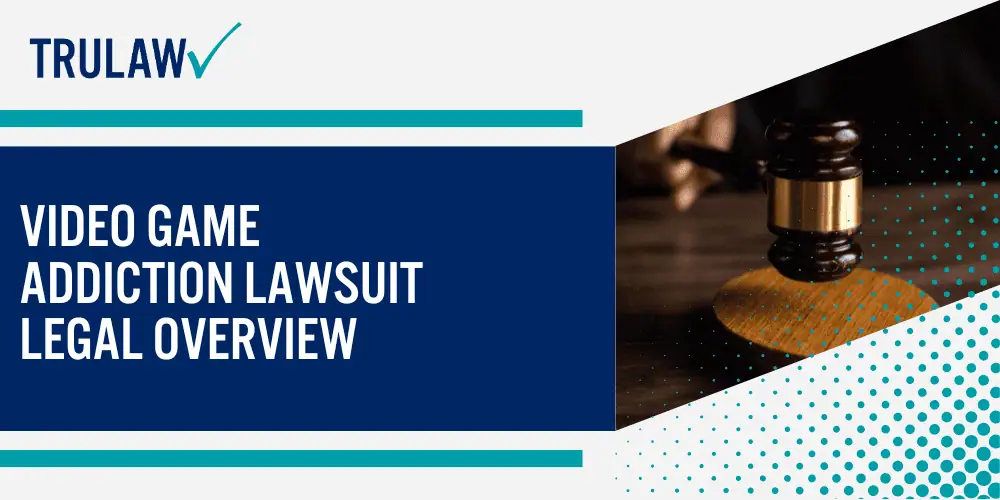
The litigation claims that companies like Epic Games, Roblox Corporation, Microsoft, Sony, Nintendo, and Activision Blizzard deliberately incorporated features such as variable reward schedules, social pressure mechanisms, and fear-based retention strategies to boost engagement and revenue at the expense of player mental health (in direct contravention of the World Health Organization’s recognition of Gaming Disorder as a legitimate medical condition).
Major Developers Facing Video Game Addiction Lawsuits
The defendants in these coordinated proceedings represent the most influential companies in the gaming industry, each facing allegations that their flagship titles employ addictive design elements targeting minors.
Epic Games faces scrutiny for Fortnite’s battle pass system and limited-time events that create urgency and compulsion among young players (which include adolescents and young adults).
Roblox Corporation is accused of creating a platform where children spend excessive amounts of time and money on virtual in game items through sophisticated psychological manipulation tactics.
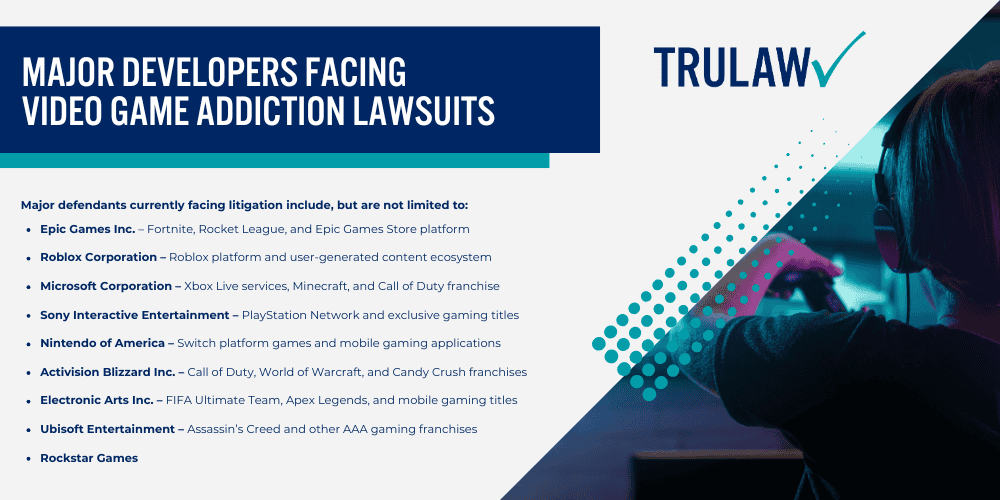
Major defendants currently facing litigation include, but are not limited to:
- Epic Games Inc. – Fortnite, Rocket League, and Epic Games Store platform
- Roblox Corporation – Roblox platform and user-generated content ecosystem
- Microsoft Corporation – Xbox Live services, Minecraft, and Call of Duty franchise
- Sony Interactive Entertainment – PlayStation Network and exclusive gaming titles
- Nintendo of America – Switch platform games and mobile gaming applications
- Activision Blizzard Inc. – Call of Duty, World of Warcraft, and Candy Crush franchises
- Electronic Arts Inc. – FIFA Ultimate Team, Apex Legends, and mobile gaming titles
- Ubisoft Entertainment – Assassin’s Creed and other AAA gaming franchises
- Rockstar Games – Grand Theft Auto and other open-world gaming franchises
The coordinated legal proceedings under JCCP No. 5363 are being overseen by Judge Samantha P. Jessner in the Los Angeles Superior Court, representing the judiciary’s recognition of the serious nature of these allegations.
This consolidation allows for more efficient discovery processes, expert witness coordination, and consistent legal standards across multiple cases, while individual families retain their right to seek damages for specific harm caused to their children by allegedly predatory gaming practices.
How Can a Video Game Addiction Cause Mental and Physical Harm?
Gaming companies employ sophisticated psychological manipulation techniques that exploit the developing reward systems in adolescent brains, creating patterns of compulsive behavior that mirror substance addiction.
The World Health Organization officially recognized Gaming Disorder in 2018, while the American Psychiatric Association included Internet Gaming Disorder as a condition requiring further study in the diagnostic and statistical manual (DSM-5), acknowledging the serious mental health implications of pathological gaming behaviors.
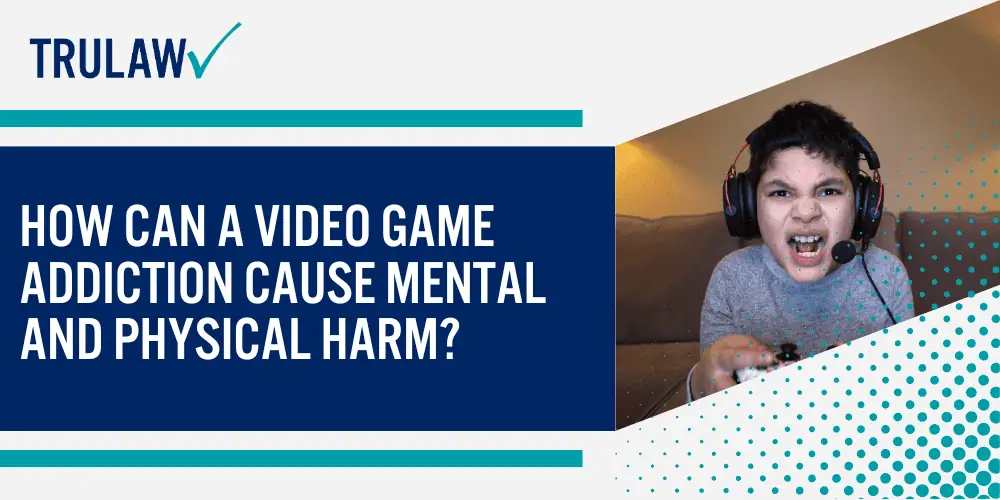
These design elements intentionally target the dopamine-driven reward pathways that are particularly vulnerable during adolescent brain development, when the prefrontal cortex responsible for impulse control and decision-making is still maturing.
Psychological Tactics: Addictive Game Mechanic Design
Modern video games employ what industry insiders call “compulsion loops” – repetitive gameplay cycles specifically designed to trigger dopamine release and maintain player engagement far beyond normal recreational use.
These psychological mechanisms include variable reward schedules, where players receive unpredictable rewards at random intervals, creating the same neurological response patterns observed in gambling addiction and substance abuse disorders.
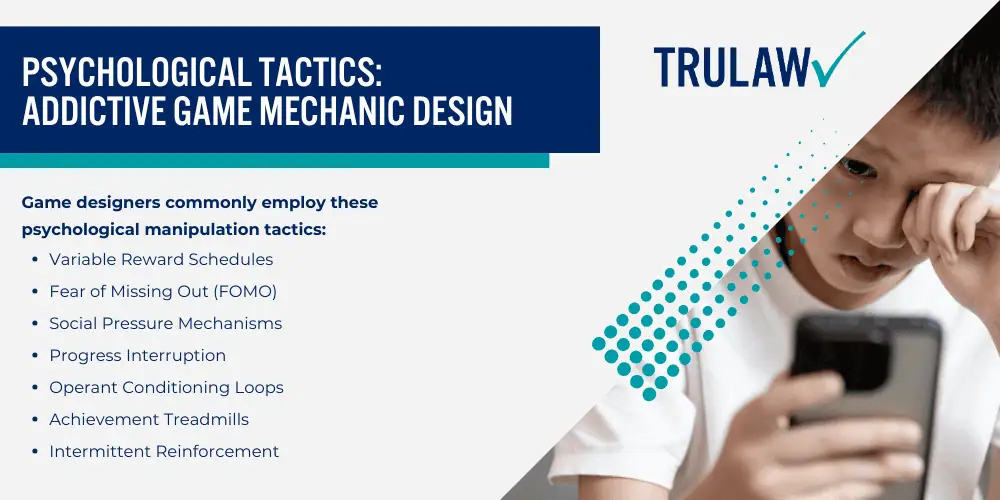
Game designers commonly employ these psychological manipulation tactics:
- Variable Reward Schedules – Random reward distribution that triggers powerful dopamine responses and compulsive gaming habits
- Fear of Missing Out (FOMO) – Limited-time events, daily login bonuses, and time-sensitive content that create anxiety and urgency
- Social Pressure Mechanisms – Leaderboards, guild requirements, and peer comparison systems that exploit social validation needs
- Progress Interruption – Deliberately slowing advancement to create frustration that can be relieved through continued play or purchases
- Operant Conditioning Loops – Systematic reinforcement schedules that condition players to associate game engagement with pleasure and relief
- Achievement Treadmills – Constantly moving goal posts that prevent players from experiencing completion or satisfaction
- Intermittent Reinforcement – Unpredictable reward timing that creates the strongest addiction potential according to behavioral psychology
Research published in the Journal of Behavioral Addictions demonstrates that these design elements specifically target the developing adolescent brain, where the prefrontal cortex responsible for impulse control won’t fully mature until age 25.
The dopamine release triggered by these gaming mechanisms can be so powerful that it “shuts down” prefrontal regions responsible for rational decision-making, leaving young gamers particularly vulnerable to compulsive gaming behaviors that can persist into adulthood.
If you or a loved one developed compulsive gaming behaviors after exposure to games using these psychological manipulation tactics, you may be eligible to seek compensation.
The neurobiological impact of these design tactics creates lasting changes in brain structure and function, with studies showing abnormal prefrontal cortex activity linked to increased gaming addiction risk, greater impulsivity, and reduced loss aversion in adolescents.
These changes mirror the neurological patterns observed in substance addiction disorders, indicating that online gaming addiction represents a genuine medical condition requiring professional treatment rather than simply a lack of willpower or poor parenting.
Incentivizing In-Game Purchases Through Microtransactions
Gaming companies have developed increasingly sophisticated monetization strategies that exploit addiction vulnerabilities to generate revenue from players, particularly targeting children and adolescents who lack fully developed financial decision-making capabilities.
Loot boxes represent one of the most controversial mechanisms, functioning as virtual gambling where players spend real money for randomized rewards of uncertain value, creating the same psychological patterns observed in casino gambling while remaining largely unregulated in most jurisdictions.
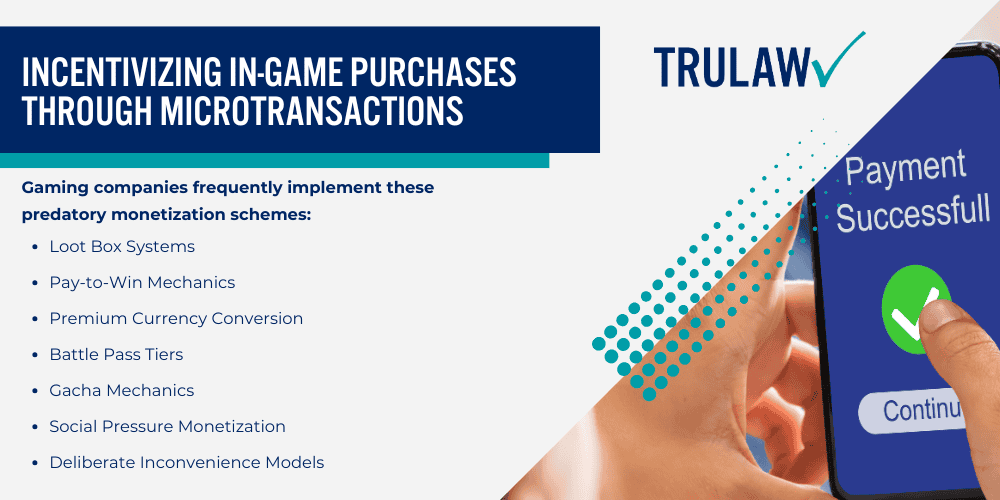
Gaming companies frequently implement these predatory monetization schemes:
- Loot Box Systems – Randomized reward mechanisms that mirror gambling psychology and create compulsive purchasing behaviors
- Pay-to-Win Mechanics – Systems where players must spend money to remain competitive, creating financial pressure and social exclusion
- Premium Currency Conversion – Intricate virtual currency systems that obscure real-world spending and enable impulsive purchases
- Battle Pass Tiers – Time-limited progression systems that create urgency and fear of permanent loss if not completed
- Gacha Mechanics – Collection-based systems with extremely low probability rates for desired items, encouraging repeated purchases
- Social Pressure Monetization – Cosmetic items and status symbols that exploit peer pressure and social comparison needs
- Deliberate Inconvenience Models – Creating frustrating gameplay experiences that can be alleviated through purchases
Research published in Royal Society Open Science found that adolescents who purchase loot boxes are notably more at risk of developing gambling disorder, with the random nature of these purchases activating the same neurological reward pathways as traditional gambling.
A comprehensive systematic review in the Journal of Behavioral Addictions confirmed that loot boxes pose greater addiction risk than other microtransactions, with greater in-game expenditure directly correlating with increased risk of both gaming and gambling disorders.
The predatory nature of these monetization schemes becomes apparent when examining their implementation targeting minors.
Games popular with children often employ bright colors, cartoon aesthetics, and celebratory animations to make spending feel like play rather than financial transactions.
These systems deliberately disguise or withhold the long-term cost of participation until players are already financially and psychologically committed, meeting the definition of deceptive business practices under consumer protection laws.
Contact TruLaw using the chat on this page to receive an instant case evaluation and determine whether you qualify to join others in filing a video game addiction lawsuit today.
This targeted exploitation of addiction vulnerabilities, particularly in minors, forms the basis for legal claims alleging that gaming companies prioritized profits over player wellbeing and violated their duty of care to protect vulnerable consumers.
Physical and Mental Health Effects of Internet Gaming Disorder
Internet Gaming Disorder, as defined in the DSM-5, represents a pattern of excessive and prolonged online gaming that results in progressive loss of control, tolerance development, and withdrawal symptoms analogous to substance use disorders.
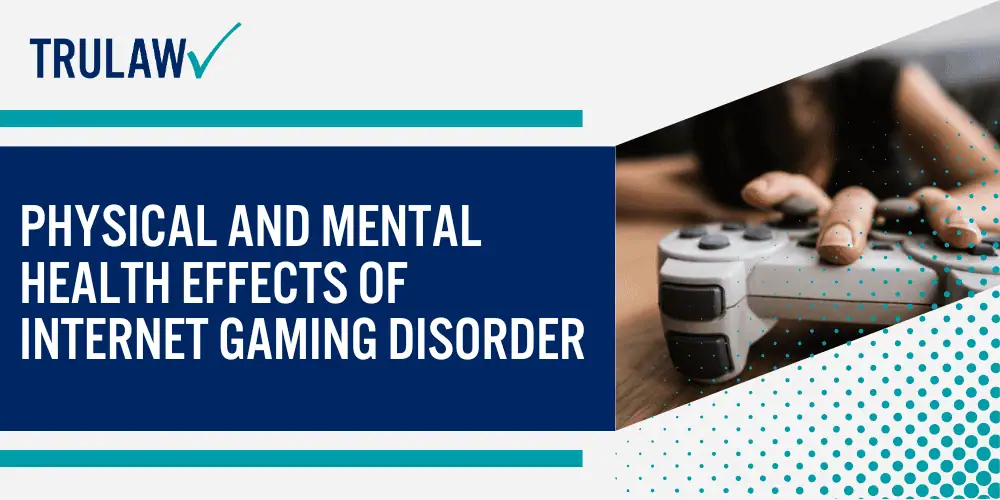
Harvard Health research and multiple peer-reviewed studies have documented extensive physical and psychological consequences ranging from repetitive stress injuries and vision problems to depression, anxiety, and cardiovascular complications that can persist long after gaming cessation.
Recognizing the Signs of Video Game Addiction
The American Psychiatric Association established nine specific criteria for diagnosing Internet Gaming Disorder, requiring at least five symptoms to be present within a 12-month period for clinical diagnosis.
These criteria provide families and healthcare professionals with standardized assessment tools to identify problematic gaming behaviors before they progress to severe addiction requiring intensive intervention.
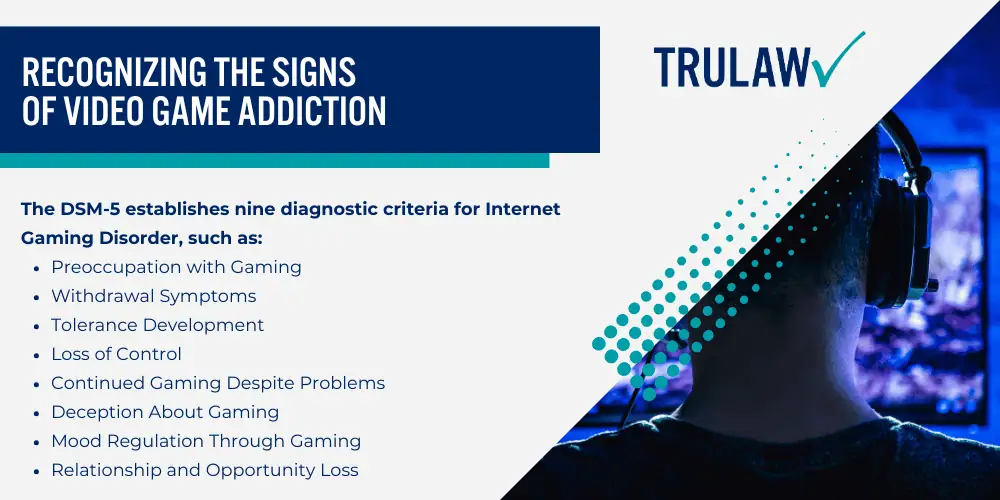
The DSM-5 establishes nine diagnostic criteria for Internet Gaming Disorder, such as:
- Preoccupation with Gaming – Persistent thoughts about gaming activities, planning next gaming session, or reliving previous gaming experiences
- Withdrawal Symptoms – Experiencing irritability, anxiety, restlessness, or sadness when gaming access is restricted or removed
- Tolerance Development – Requiring progressively longer gaming sessions to achieve previous levels of satisfaction or excitement
- Loss of Control – Unsuccessful attempts to reduce gaming time despite recognition of negative consequences
- Diminished Interest – reduction in previous hobbies, recreational activities, and social interactions outside of gaming
- Continued Gaming Despite Problems – Persisting with excessive gaming despite awareness of academic, social, or occupational problems
- Deception About Gaming – Lying to family members, therapists, or others about actual time spent gaming or gaming-related expenses
- Mood Regulation Through Gaming – Using gaming as primary method to escape negative emotions, relieve anxiety, or cope with stress
- Relationship and Opportunity Loss – Jeopardizing or losing personal relationships, educational opportunities, or career prospects due to gaming
Research published in Frontiers in Psychology demonstrates that these symptoms typically develop progressively over months or years, with early warning signs often dismissed as normal gaming enthusiasm.
The transition from recreational gaming to pathological gaming disorder frequently occurs during adolescence when the prefrontal cortex responsible for impulse control and risk assessment is still developing, making early identification and intervention particularly important for preventing long-term consequences.
Clinical assessment methods now include specialized screening tools and behavioral monitoring techniques that can identify at-risk individuals before full addiction develops.
Professional gaming addiction assessments typically evaluate gaming frequency, duration, financial expenditure, social function impacts, and the presence of withdrawal symptoms when gaming access is restricted, providing comprehensive evaluation frameworks for families seeking help.
Physical Injuries and Health Consequences
Excessive gaming creates physical health risks through prolonged sedentary behavior, repetitive motion injuries, and disruption of normal physiological processes that can result in both acute injuries and chronic health conditions.
Harvard Health research specifically documents connections between extended gaming sessions and multiple physical health complications that can require medical intervention and long-term rehabilitation.
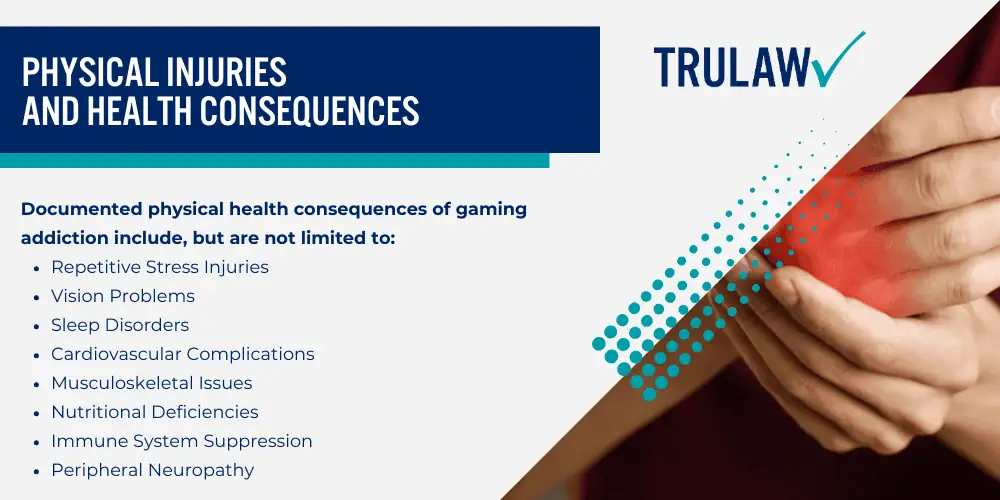
Documented physical health consequences of gaming addiction include, but are not limited to:
- Repetitive Stress Injuries – Carpal tunnel syndrome, tendinitis, and chronic wrist, neck, and elbow pain from prolonged controller or keyboard use
- Vision Problems – Computer vision syndrome, dry eye, blurred vision, and potential long-term retinal damage from extended screen exposure
- Sleep Disorders – Circadian rhythm disruption, insomnia, and sleep deprivation caused by late-night gaming and blue light exposure
- Cardiovascular Complications – Elevated blood pressure, increased heart rate, and blood clot risks from prolonged periods of physical inactivity
- Musculoskeletal Issues – Poor posture leading to chronic back pain, muscle weakness, and spinal alignment problems
- Nutritional Deficiencies – Poor eating habits, dehydration, and vitamin deficiencies from prioritizing gaming over proper nutrition
- Immune System Suppression – Reduced immune function from chronic stress, sleep deprivation, and poor self-care habits
- Peripheral Neuropathy – Numbness and weakness in hands and fingers from repetitive motion and nerve compression
A comprehensive study published in PLOS One found that adolescents with gaming addiction showed substantially higher rates of obesity, metabolic dysfunction, and cardiovascular risk factors compared to non-addicted peers.
The research documented that excessive gaming creates a cascade of health problems where sleep curtailment and physical inactivity combine to create long-term cardio-metabolic deficiencies that can persist into adulthood.
The physical manifestations of gaming addiction often develop gradually, making them easy to dismiss initially.
Medical experts warn that repetitive stress injuries and postural problems established during adolescence can become permanent disabilities requiring surgical intervention and lifelong management.
The combination of sedentary behavior, poor nutrition, and disrupted sleep creates a perfect storm for developing chronic health conditions that extend far beyond gaming behavior itself.
If you or a loved one suffered physical health complications after developing gaming addiction, you may be eligible to seek compensation for medical expenses and ongoing treatment costs.
Emergency room visits related to gaming addiction have increased substantially, with healthcare providers reporting cases of severe dehydration, blood clots, and cardiovascular events in young patients with histories of excessive gaming.
These acute medical emergencies highlight the serious physical dangers posed by pathological gaming behaviors and the urgent need for industry accountability in protecting vulnerable players from harm.
Long-Term Effects of Video Game Addictions
Gaming addiction creates lasting developmental disruptions that can fundamentally alter a person’s life trajectory, particularly when the addiction develops during adolescence when normal brain development and social skill acquisition occur.
Research published in comprehensive systematic reviews demonstrates that the interference with normal adolescent brain development patterns can create permanent deficits in executive function, emotional regulation, and social competence that persist long after gaming behaviors are controlled.
The adolescent brain’s heightened neuroplasticity, while making it more susceptible to addiction, also means that unhealthy neural pathways established during this period become deeply ingrained and resistant to change in adulthood.
Gaming addiction interferes with normal adolescent brain development and social skill acquisition by monopolizing the time and mental resources typically devoted to real-world learning experiences, peer interactions, and identity formation that are impossible to replicate later in life.
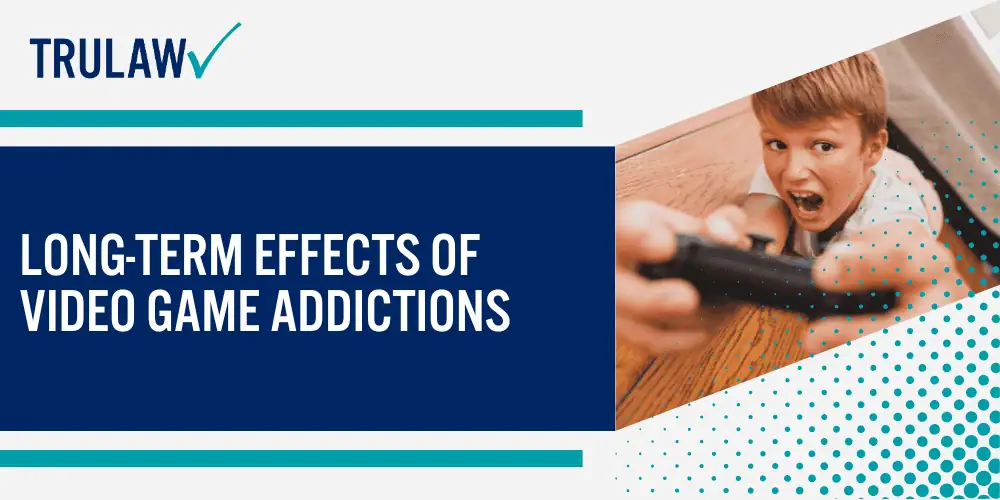
During the important developmental window between ages 12-25, when the prefrontal cortex is establishing connections responsible for impulse control, planning, and social judgment, excessive gaming creates alternative reward pathways that can supersede normal developmental priorities and create lasting psychological dependencies that require professional intervention to address.
Emotional, Social, and Academic Impact of Gaming Addiction
Research consistently demonstrates that gaming addiction creates cascading effects across multiple domains of functioning, with academic performance serving as an early indicator of broader developmental disruption.
Studies published in leading psychology journals show that video game addicts experience decreases in academic achievement motivation, with reduced learning engagement serving as a mediating factor between gaming addiction and academic failure.
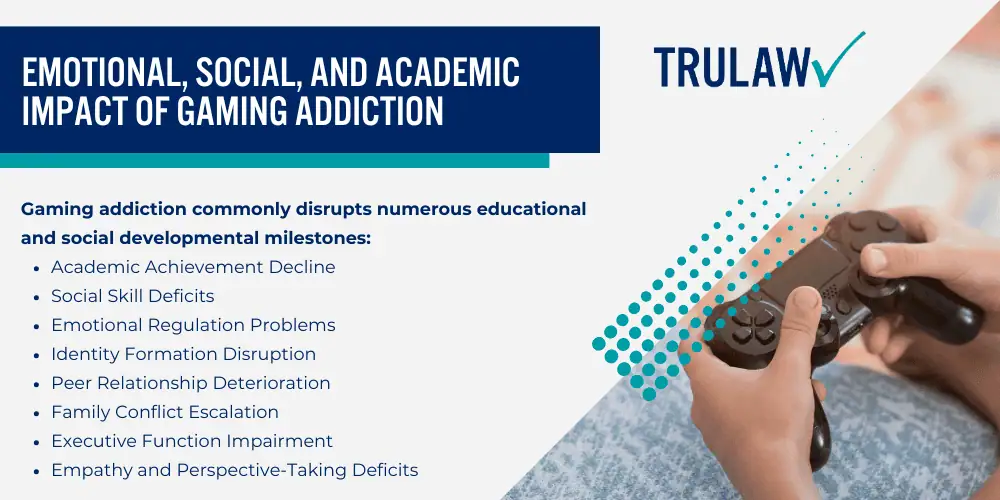
Gaming addiction commonly disrupts numerous educational and social developmental milestones:
- Academic Achievement Decline – Lower grades, reduced academic motivation, and increased school absenteeism leading to educational setbacks
- Social Skill Deficits – Impaired ability to read social cues, maintain face-to-face relationships, and develop emotional intimacy with peers
- Emotional Regulation Problems – Increased irritability, mood swings, and difficulty managing frustration without gaming as a coping mechanism
- Identity Formation Disruption – Over-identification with virtual achievements rather than developing real-world competencies and self-concept
- Peer Relationship Deterioration – Loss of non-gaming friendships, social isolation, and difficulty forming age-appropriate romantic relationships
- Family Conflict Escalation – Increased arguments, broken trust, and deteriorating communication with parents and siblings
- Executive Function Impairment – Reduced ability to plan, organize, prioritize tasks, and manage time effectively in academic and social contexts
- Empathy and Perspective-Taking Deficits – Decreased ability to understand others’ emotions and viewpoints due to reduced real-world social interaction
A comprehensive meta-analysis examining gaming addiction across multiple populations found that affected individuals showed substantially lower self-esteem, life satisfaction, and social support compared to non-addicted peers.
The research documented that these effects compound over time, with longer duration of addiction correlating with more severe and persistent psychological difficulties that extend into adulthood career prospects and relationship formation.
The academic consequences of gaming addiction often create permanent educational disadvantages, with students missing opportunities for college preparation, scholarship eligibility, and skill development that cannot be recovered later.
Research conducted in Bangladesh during the COVID-19 pandemic revealed that students with gaming addiction showed dramatically lower academic performance across all subjects, with effects that persisted even after gaming time was reduced, suggesting that the cognitive and motivational changes may have lasting impacts on learning capacity.
Family relationships suffer profound and often irreparable damage as gaming addiction progresses, with trust breaking down through deception about gaming time and expenses, communication patterns deteriorating due to gaming-related conflict, and emotional bonds weakening as the addicted individual becomes increasingly isolated and defensive.
Parents frequently report feeling helpless and frustrated as traditional disciplinary approaches prove ineffective against sophisticated psychological manipulation built into modern games, creating family dynamics characterized by resentment, disappointment, and mutual blame that can persist long after the addiction is addressed.
Ethical and Legal Boundaries in Video Game Development
The gaming industry has systematically prioritized engagement metrics and revenue generation over player wellbeing through the implementation of what researchers term “dark patterns” – deliberately deceptive design elements that exploit psychological vulnerabilities to keep players engaged and encourage excessive play.
These practices raise serious questions about corporate responsibility and consumer protection, particularly when targeting minors who lack the cognitive development necessary to recognize and resist sophisticated psychological manipulation techniques.
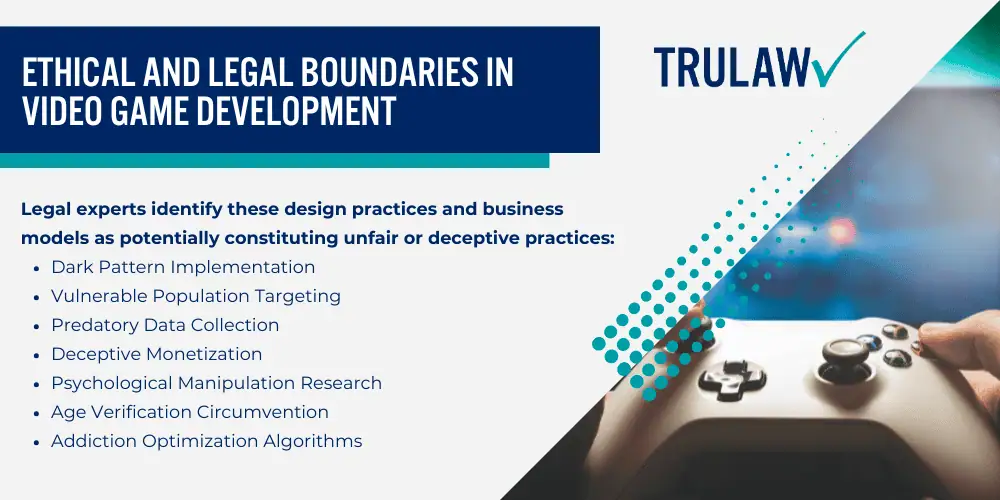
Legal experts identify these design practices and business models as potentially constituting unfair or deceptive practices:
- Dark Pattern Implementation – Deliberately confusing user interfaces, hidden costs, and manipulative design elements that exploit cognitive biases
- Vulnerable Population Targeting – Specifically designing features to exploit children, individuals with mental health conditions, and those with addiction vulnerabilities
- Predatory Data Collection – Using player behavior analytics to identify and target individuals most susceptible to a game’s addictive nature
- Deceptive Monetization – Virtual currency systems that obscure real-world spending and encourage impulsive financial decisions
- Psychological Manipulation Research – Conducting behavioral experiments on users without informed consent to optimize addictive potential
- Age Verification Circumvention – Designing systems that allow underage users to bypass parental controls and age restrictions
- Addiction Optimization Algorithms – Using artificial intelligence and machine learning to encourage compulsive gaming through personalized manipulation tactics
The European Parliament has specifically identified these practices as requiring immediate regulatory intervention, noting that children are particularly vulnerable to dark patterns within video games that exploit developmental psychology principles.
Consumer protection authorities across multiple jurisdictions have begun enforcement actions against major gaming companies for practices that prioritize profits over player welfare, especially regarding protection of minors from harmful gaming experiences.
If you or a loved one suffered long-term developmental, educational, or social harm due to gaming addiction caused by predatory design practices, you may be eligible to seek compensation for these damages.
The regulatory gap surrounding gaming industry practices has created an environment where companies can implement increasingly sophisticated manipulation techniques with minimal oversight or accountability.
Industry documents and expert testimonies reveal that major gaming companies employ teams of behavioral psychologists, data scientists, and addiction specialists specifically to identify and exploit psychological vulnerabilities that optimize player engagement and spending.
This systematic approach to addiction optimization represents a fundamental breach of corporate responsibility to consumers and provides legal grounds for holding these companies accountable for the harm their products have caused to vulnerable individuals and families seeking justice through the legal system.
Do You Qualify for the Video Game Addiction Lawsuit?
Eligibility for video game addiction litigation typically requires demonstrating both documented gaming addiction and demonstrable harm from specific games or companies, with most law firms focusing on cases involving individuals aged 24 or younger who experienced substantial mental health, physical, or financial consequences from alleged predatory game design practices.
The coordinated proceedings under JCCP No. 5363 have established clearer frameworks for case evaluation, though individual circumstances will vary and require professional legal assessment to determine qualification for compensation given the Cleveland Clinic’s documentation of gaming addiction’s medical and psychological manifestations.
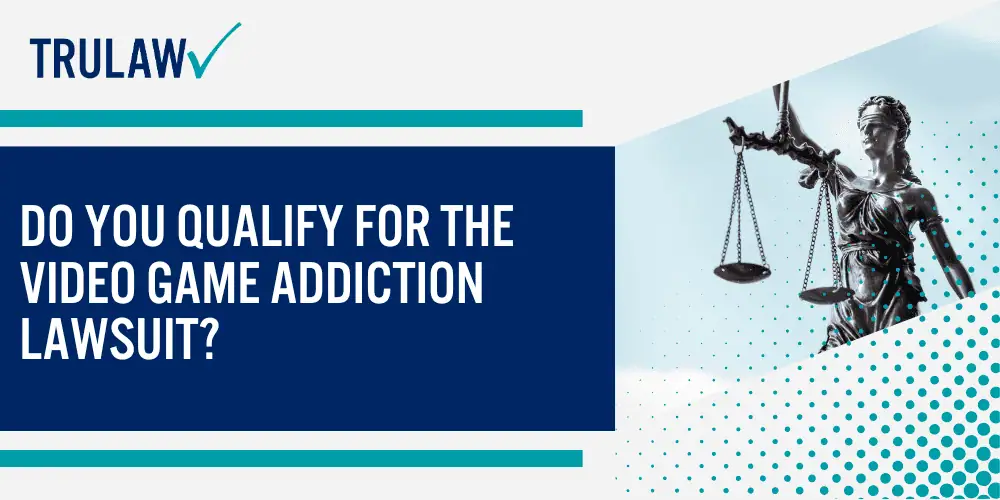
Successful video game addiction claims generally require meeting specific threshold criteria including documented gaming frequency (typically 2+ hours daily for extended periods), evidence of addiction-related harm through medical records or professional assessments, and clear connections between gaming behavior and negative life consequences such as academic failure, social isolation, or mental health deterioration.
Legal experts emphasize that these cases differ from traditional product liability claims, requiring specialized evidence that demonstrates how specific game design elements contributed to addictive behaviors and resulting damages.
Gathering Evidence for Your Video Game Addiction Lawsuit
Building a successful video game addiction case requires comprehensive documentation that establishes both the presence of gaming addiction and its connection to specific predatory design practices employed by gaming companies.
Legal experts recommend beginning evidence collection immediately, as gaming platforms may delete historical data and medical records require time to obtain from multiple healthcare providers who may have treated addiction-related symptoms.
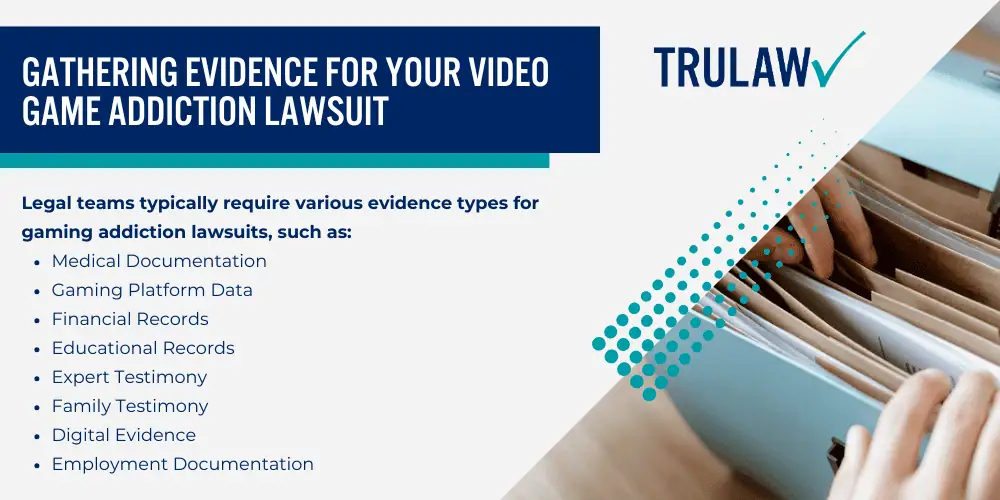
Legal teams typically require various evidence types for gaming addiction lawsuits, such as:
- Medical Documentation – Professional gaming addiction diagnoses, psychological evaluations, treatment records for depression, anxiety, or other mental health conditions
- Gaming Platform Data – Usage logs, play time statistics, login patterns, achievement records from gaming platforms and consoles, and gaming history
- Financial Records – Receipts for game purchases, in-game transaction histories, credit card statements showing gaming-related expenses, and subscription costs
- Educational Records – Academic transcripts showing grade decline, school attendance records, teacher reports about behavioral changes
- Expert Testimony – Input from behavioral psychologists, addiction specialists, or medical professionals explaining gaming addiction mechanisms
- Family Testimony – Detailed accounts from parents, siblings, or friends documenting behavioral changes, social isolation, and family relationship deterioration
- Digital Evidence – Screenshots of game interfaces, chat logs, social media posts, and other digital communications related to gaming behavior
- Employment Documentation – Work performance records, missed work days, or employment termination related to gaming behavior
Professional gaming addiction assessments typically evaluate multiple factors including gaming frequency and duration, financial expenditure on games, social function impacts, and the presence of withdrawal symptoms when gaming access is restricted.
The importance of preserving digital evidence cannot be overstated, as gaming companies may modify or delete platform data that could support legal claims.
Legal experts recommend taking screenshots of gaming interfaces, saving chat logs and social media posts related to gaming, and requesting data downloads from gaming platforms before filing lawsuits, as companies may restrict access to user data once litigation begins.
Digital forensics experts can often recover additional evidence from gaming devices, including deleted files, browser histories, and application usage patterns that demonstrate the extent of gaming behavior and its impact on other activities.
This technical evidence, combined with medical documentation and expert testimony, creates a comprehensive picture of how predatory game design contributed to addiction development and resulting life consequences.
Potential Damages in Video Game Addiction Cases
Video game addiction lawsuits seek both compensatory damages to address specific harms suffered by victims and punitive damages aimed at deterring the gaming industry from continuing predatory design practices that target vulnerable populations.
While no standardized settlement amounts have been established due to the early stage of this litigation, legal experts predict that severe cases could result in compensation totaling tens of thousands of dollars, particularly when addiction has disrupted long-term educational or career prospects.
Please be advised that any projected or estimated settlement amounts mentioned on this page are general estimations based on similar previous litigations and are not guaranteed, as each legal case has distinct details and circumstances that can greatly impact the result.
This information does not constitute legal advice and does not address your specific situation.
Contact TruLaw using the chat on this page to receive an instant case evaluation that can help you gain a better understanding of the damages you may be eligible to seek compensation for.
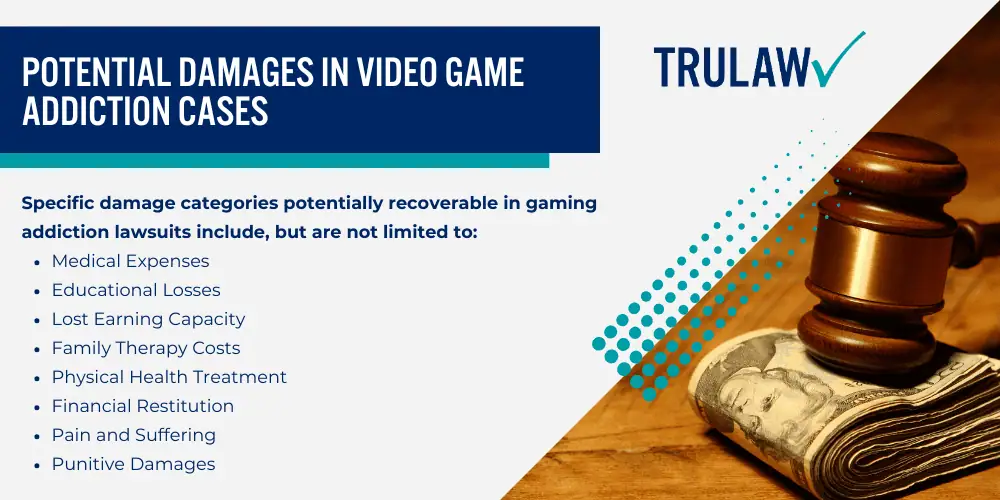
Specific damage categories potentially recoverable in gaming addiction lawsuits include, but are not limited to:
- Medical Expenses – Costs for addiction treatment, psychological therapy, psychiatric care, and ongoing mental health treatment
- Educational Losses – Tutoring costs, repeat coursework expenses, lost scholarship opportunities, and reduced college admission prospects
- Lost Earning Capacity – Reduced future income potential due to educational disruption, career derailment, or skill development delays
- Family Therapy Costs – Treatment for family relationships damaged by gaming addiction and related behavioral problems
- Physical Health Treatment – Medical care for repetitive stress injuries, vision problems, sleep disorders, and other gaming-related health issues
- Financial Restitution – Recovery of excessive in-game purchases, subscription fees, and other gaming-related financial losses
- Pain and Suffering – Compensation for emotional distress, social isolation, anxiety, depression, and reduced quality of life
- Punitive Damages – Additional compensation intended to punish gaming companies and deter future predatory practices targeting vulnerable populations
Legal experts anticipate that video game addiction settlements could be organized into tier structures based on injury severity, with more profound psychological harm and longer-term life disruption resulting in higher compensation amounts.
Cases involving severe mental health consequences, educational disruption, or major family relationship damage are expected to receive substantially higher settlements than those with more limited impacts.
If you or a loved one suffered harm from gaming addiction caused by predatory game design practices, you may be eligible to seek substantial compensation for medical expenses, educational losses, and other damages.
The potential for punitive damages represents a substantial concern for gaming companies, as courts may award considerable additional compensation to deter industry-wide predatory practices.
Early case evaluations suggest that the most valuable claims will involve documented cases of severe gaming addiction with clear medical evidence, substantial financial losses from gaming activities, and strong connections between specific game design elements and resulting harm, particularly those showing aggressive behavior linked to gaming.
Legal experts recommend immediate consultation with specialized attorneys to preserve evidence and evaluate potential case value before statute of limitations periods expire.
TruLaw: Investigating the Video Game Addiction Lawsuits
TruLaw recognizes the serious nature of video game addiction litigation and the profound impact that predatory gaming practices have had on families across the United States.
Our legal team understands the sophisticated psychological manipulation techniques employed by major gaming companies and the devastating consequences these practices can have on vulnerable individuals, particularly children and adolescents whose developing brains are most susceptible to addiction-inducing game design elements that lead to serious mental health concerns.
TruLaw partners with video game addiction litigation leaders to provide clients with the legal resources and support necessary for a successful outcome.
Our comprehensive approach to gaming addiction cases includes thorough case evaluation, evidence preservation guidance, coordination with medical experts who specialize in gaming disorder diagnosis and treatment, and aggressive pursuit of accountability from gaming companies that have prioritized profits over player wellbeing.
TruLaw commonly provides these video game addiction legal services:
- Free Case Evaluation – Comprehensive assessment of your gaming addiction claim to determine eligibility and potential case value
- Evidence Collection Guidance – Expert assistance in gathering medical records, gaming data, and financial documentation needed for your case
- Medical Expert Coordination – Access to qualified healthcare professionals who can provide gaming addiction assessments and treatment recommendations
- Litigation Strategy Development – Customized legal approaches tailored to the specific circumstances of your gaming addiction case
- Family Support Resources – Connections to counseling services and support groups to help families heal from gaming addiction trauma
The coordinated legal proceedings under JCCP No. 5363 represent an unprecedented opportunity for gaming addiction victims to seek justice against an industry that has systematically exploited psychological vulnerabilities for financial gain.
TruLaw’s involvement in this litigation ensures that our clients benefit from the collective legal expertise, shared discovery resources, and coordinated strategy development that comes with consolidated proceedings under California’s coordinated case system while maintaining individual attention to their specific circumstances and damages.
Our legal team stays current with rapidly evolving developments in gaming addiction litigation, including new evidence of predatory design practices, emerging medical research on gaming disorder, and regulatory responses to industry misconduct.
This ongoing commitment to staying at the forefront of gaming addiction law ensures that our clients receive the most effective legal representation possible as these groundbreaking cases proceed through the court system.
If you or a loved one developed gaming addiction after playing games designed with manipulative psychological tactics, you may be eligible to seek compensation.
Contact TruLaw using the chat on this page to receive an instant case evaluation and determine whether you qualify to join others in filing a video game addiction lawsuit today.
How Can A Video Game Addiction Attorney from TruLaw Help You?
Our Video Game Addiction attorney at TruLaw is dedicated to supporting clients through the process of filing a Video Game Addiction lawsuit.
With extensive experience in product liability cases, Jessica Paluch-Hoerman and our partner law firms work with litigation leaders and mental health professionals to prove how certain video games with deliberately addictive features caused you harm.
TruLaw focuses on securing compensation for mental health treatment expenses, academic and career setbacks, family relationship damages, and other losses resulting from your video game addiction injuries.
We understand the psychological and social toll that Video Game Addiction issues have on your life and provide the personalized guidance you need when seeking justice.
Meet the Lead Video Game Addiction Attorney at TruLaw
Meet our lead Video Game Addiction attorney:
- Jessica Paluch-Hoerman: As founder and managing attorney of TruLaw, Jessica brings her experience in product liability and personal injury to her client-centered approach by prioritizing open communication and personalized attention with her clients. Through TruLaw and partner law firms, Jessica has helped collect over $3 billion on behalf of injured individuals across all 50 states through verdicts and negotiated settlements.
How much does hiring a Video Game Addiction lawyer from TruLaw cost?
At TruLaw, we believe financial concerns should never stand in the way of justice.
That’s why we operate on a contingency fee basis—with this approach, you only pay legal fees after you’ve been awarded compensation for your injuries.
If you or a loved one experienced addiction, depression, sleep disorders, social isolation, or other mental health problems from excessive video game use, you may be eligible to seek compensation.
Contact TruLaw using the chat on this page to receive an instant case evaluation and determine whether you qualify to join others in filing a Video Game Addiction Lawsuit today.
TruLaw: Accepting Clients for the Video Game Addiction Lawsuit
Video game addiction lawsuits are being filed by individuals and families across the country who suffered mental health injuries and addiction from video games designed with manipulative features.
TruLaw is currently accepting clients for the video game addiction lawsuit.
A few reasons to choose TruLaw for your video game addiction lawsuit include:
- If We Don’t Win, You Don’t Pay: The video game addiction lawyers at TruLaw and our partner firms operate on a contingency fee basis, meaning we only get paid if you win.
- Expertise: We have decades of experience handling consumer protection cases similar to the video game addiction lawsuit.
- Successful Track Record: TruLaw and our partner law firms have helped our clients recover billions of dollars in compensation through verdicts and negotiated settlements.
If you or a loved one suffered from video game addiction or related mental health problems, you may be eligible to seek compensation.
Contact TruLaw using the chat on this page to receive an instant case evaluation that can determine if you qualify for the video game addiction lawsuit today.
Video Game Addiction Lawsuit Frequently Asked Questions
-
Parents absolutely can file lawsuits on behalf of minor children who have developed gaming addiction, particularly when games employ predatory mechanics specifically designed to exploit children’s developmental vulnerabilities and create compulsive spending behaviors.
Gaming companies know that children lack fully developed impulse control and decision-making capabilities, yet deliberately target this vulnerable population with manipulative design features including variable reward schedules, social pressure mechanics, and pay-to-win systems that create addiction.
Courts increasingly recognize that parents can seek compensation for their children’s gaming addiction damages, including medical treatment costs, educational impacts, and the financial losses from unauthorized in-game purchases that many popular games facilitate through confusing interfaces.
-
Filing a gaming addiction lawsuit typically requires no upfront payment from clients, as reputable attorneys work on contingency fee arrangements where they only collect fees if successfully recovering compensation through settlement or trial verdict.
Standard contingency fees range from 33-40% of the total recovery, with attorneys advancing all case costs including expert witnesses, depositions, and trial expenses that can total tens of thousands of dollars in litigation.
Contact TruLaw using the chat on this page to receive a free case evaluation that can help determine your eligibility to join others in filing a Video Game Addiction Lawsuit today.
-
Proving gaming addiction claims requires medical documentation from qualified professionals confirming gaming disorder diagnosis under ICD-11 criteria, including evidence of impaired control, functional impairment, and pattern persistence for at least 12 months.
Financial records demonstrating monetary losses through bank statements, credit card records, and in-game purchase histories provide concrete evidence of economic damages, while employment records, academic transcripts, and relationship documentation establish broader life impacts.
The combination of medical diagnosis, financial documentation, and evidence of real-world consequences creates compelling cases that gaming companies struggle to defend against, particularly when gameplay data shows excessive daily usage patterns consistent with addiction.
-
Statute of limitations for gaming addiction lawsuits varies by state, typically ranging from 2-4 years from the date you discovered or reasonably should have discovered that gaming addiction caused your damages.
The discovery rule often extends filing deadlines in addiction cases where the connection between gaming and life damages may not be immediately apparent, particularly for gradual addiction development over multiple years.
Minors receive special protection with limitation periods generally not beginning until they reach age 18, providing extended opportunities to pursue claims for childhood gaming addiction even years after the initial exposure to predatory game mechanics.
-
Filing a gaming addiction lawsuit typically does not result in any restrictions on future gaming, as these cases focus on obtaining financial compensation for past damages rather than imposing behavioral limitations on plaintiffs.
While some settlement agreements may include voluntary commitments to gaming moderation as part of demonstrating ongoing recovery efforts, courts do not issue injunctions preventing plaintiffs from gaming, recognizing that addiction recovery is a personal journey.
The goal of litigation is holding gaming companies accountable for predatory designs and compensating victims for their losses, not punishing players for falling victim to intentionally addictive products.
-
Video game addiction settlements vary widely based on documented damages, ranging from thousands of dollars for cases with limited financial impact to hundreds of thousands for severe cases involving substantial economic losses, career destruction, and ongoing medical treatment needs.
While many settlements remain confidential due to standard non-disclosure agreements, industry sources report typical ranges of $100,000-$300,000 for well-documented individual cases with clear causation between gaming addiction and life damages.
The relative newness of gaming addiction litigation means settlement values continue evolving as more cases establish precedent, with early strong verdicts likely to drive up average settlement values as gaming companies seek to avoid publicity from trial losses.
Each legal case has distinct details and circumstances that can greatly impact the result.
This information does not constitute legal advice and does not address your specific situation.
Contact TruLaw using the chat on this page to receive an instant case evaluation that can help you gain a better understanding of the damages you may be able to pursue compensation for.
-
The combination of growing medical recognition of gaming disorder, mounting evidence of intentional predatory design, and successful regulatory actions against gaming companies creates an unprecedented opportunity for addiction victims to seek justice and compensation.
Whether you’re a parent watching your child’s life derail due to gaming addiction or an adult who lost everything to predatory game mechanics, qualified legal representation can help you hold gaming companies accountable for their deliberate exploitation of human psychology for profit.
Contact TruLaw using the chat on this page to receive an instant case evaluation and determine whether you qualify to join others in filing a video game addiction lawsuit today.

Managing Attorney & Owner
With over 25 years of legal experience, Jessica Paluch-Hoerman is an Illinois lawyer, a CPA, and a mother of three. She spent the first decade of her career working as an international tax attorney at Deloitte.
In 2009, Jessie co-founded her own law firm with her husband – which has scaled to over 30 employees since its conception.
In 2016, Jessie founded TruLaw, which allows her to collaborate with attorneys and legal experts across the United States on a daily basis. This hypervaluable network of experts is what enables her to share the most reliable, accurate, and up-to-date legal information with our readers!
Additional Video Game Addiction Lawsuit resources on our website:
Here, at TruLaw, we’re committed to helping victims get the justice they deserve.
Alongside our partner law firms, we have successfully collected over $3 Billion in verdicts and settlements on behalf of injured individuals.
Would you like our help?
At TruLaw, we fiercely combat corporations that endanger individuals’ well-being. If you’ve suffered injuries and believe these well-funded entities should be held accountable, we’re here for you.
With TruLaw, you gain access to successful and seasoned lawyers who maximize your chances of success. Our lawyers invest in you—they do not receive a dime until your lawsuit reaches a successful resolution!
AFFF Lawsuit claims are being filed against manufacturers of aqueous film-forming foam (AFFF), commonly used in firefighting.
Claims allege that companies such as 3M, DuPont, and Tyco Fire Products failed to adequately warn users about the potential dangers of AFFF exposure — including increased risks of various cancers and diseases.
Depo Provera Lawsuit claims are being filed by individuals who allege they developed meningioma (a type of brain tumor) after receiving Depo-Provera birth control injections.
A 2024 study found that women using Depo-Provera for at least 1 year are five times more likely to develop meningioma brain tumors compared to those not using the drug.
Suboxone Tooth Decay Lawsuit claims are being filed against Indivior, the manufacturer of Suboxone, a medication used to treat opioid addiction.
Claims allege that Indivior failed to adequately warn users about the potential dangers of severe tooth decay and dental injuries associated with Suboxone’s sublingual film version.
Social Media Harm Lawsuits are being filed against social media companies for allegedly causing mental health issues in children and teens.
Claims allege that companies like Meta, Google, ByteDance, and Snap designed addictive platforms that led to anxiety, depression, and other mental health issues without adequately warning users or parents.
Transvaginal Mesh Lawsuits are being filed against manufacturers of transvaginal mesh products used to treat pelvic organ prolapse (POP) and stress urinary incontinence (SUI).
Claims allege that companies like Ethicon, C.R. Bard, and Boston Scientific failed to adequately warn about potential dangers — including erosion, pain, and infection.
Bair Hugger Warming Blanket Lawsuits involve claims against 3M — alleging their surgical warming blankets caused severe infections and complications (particularly in hip and knee replacement surgeries).
Plaintiffs claim 3M failed to warn about potential risks — despite knowing about increased risk of deep joint infections since 2011.
Baby Formula NEC Lawsuit claims are being filed against manufacturers of cow’s milk-based baby formula products.
Claims allege that companies like Abbott Laboratories (Similac) and Mead Johnson & Company (Enfamil) failed to warn about the increased risk of necrotizing enterocolitis (NEC) in premature infants.
Here, at TruLaw, we’re committed to helping victims get the justice they deserve.
Alongside our partner law firms, we have successfully collected over $3 Billion in verdicts and settlements on behalf of injured individuals.
Would you like our help?

